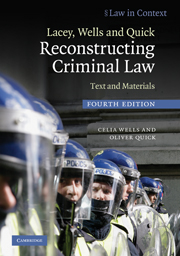Book contents
- Frontmatter
- Contents
- Preface
- Table of cases
- Table of statutes
- Section I Approaching Criminal Law
- Section II Law, Order and Security
- Section III Interpersonal Violence; Drugs and Alcohol Abuse; Offence Preparation and Participation
- Section IV Property and Propriety
- 11 Defining and Defending Private Property
- 12 Constructing Property in Criminal Law
- 13 Property Rights and Criminal Enforcement
- Section V Regulating Sexuality and Bodily autonomy
- Section VI Making a Killing
- Bibliography
- Index
- References
13 - Property Rights and Criminal Enforcement
from Section IV - Property and Propriety
Published online by Cambridge University Press: 05 June 2012
- Frontmatter
- Contents
- Preface
- Table of cases
- Table of statutes
- Section I Approaching Criminal Law
- Section II Law, Order and Security
- Section III Interpersonal Violence; Drugs and Alcohol Abuse; Offence Preparation and Participation
- Section IV Property and Propriety
- 11 Defining and Defending Private Property
- 12 Constructing Property in Criminal Law
- 13 Property Rights and Criminal Enforcement
- Section V Regulating Sexuality and Bodily autonomy
- Section VI Making a Killing
- Bibliography
- Index
- References
Summary
In the area of offences against property, as in other contexts, we cannot achieve real insight into the nature of criminal law without examining how it is enforced. As we shall see in this section, the relative frequency of property crime has bred a diversification of enforcement practices, ranging from the formal to the informal, the publicly scrutinised to the privately controlled, the civil to the criminal. This diversity reflects the complexity of our responses to threats to property: it also raises a number of important political issues concerning accountability in and selectivity of enforcement. In particular, the eminently movable boundaries between formal and informal and between civil and criminal enforcement render discretion and discrimination important issues in the area of protection of interests in property.
Both historical and contemporary evidence reveal an important interaction between enforcement practice and the meaning of the criminal law. Blackstone berated the common law for its unjust severity in relation to grand larceny and notes the ‘pious perjury’ on the part of juries which this engendered: juries would find the value of the goods to be a shilling or less in order to avoid the death penalty. Similarly, Beattie's evidence suggests that grand larcenies were rather rarely prosecuted, particularly from the late eighteenth century when popular confidence in the jury system was waning and distaste for the draconian punishments was growing.
- Type
- Chapter
- Information
- Lacey, Wells and Quick Reconstructing Criminal LawText and Materials, pp. 449 - 472Publisher: Cambridge University PressPrint publication year: 2010



